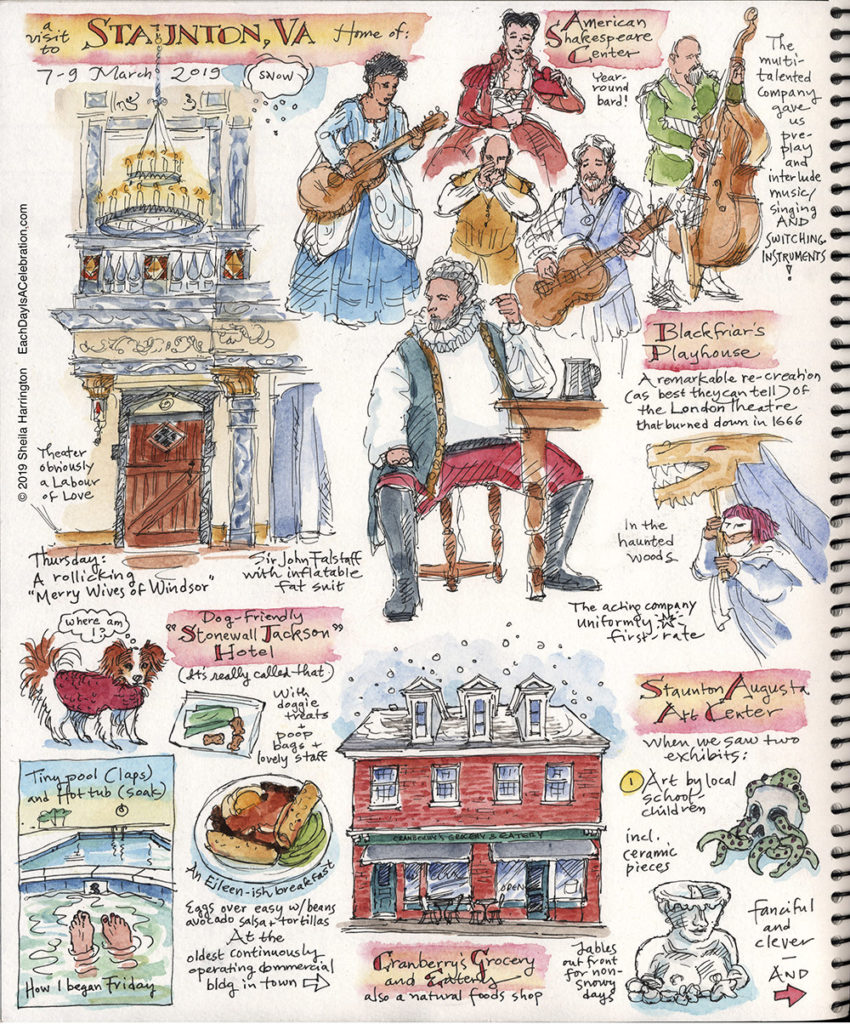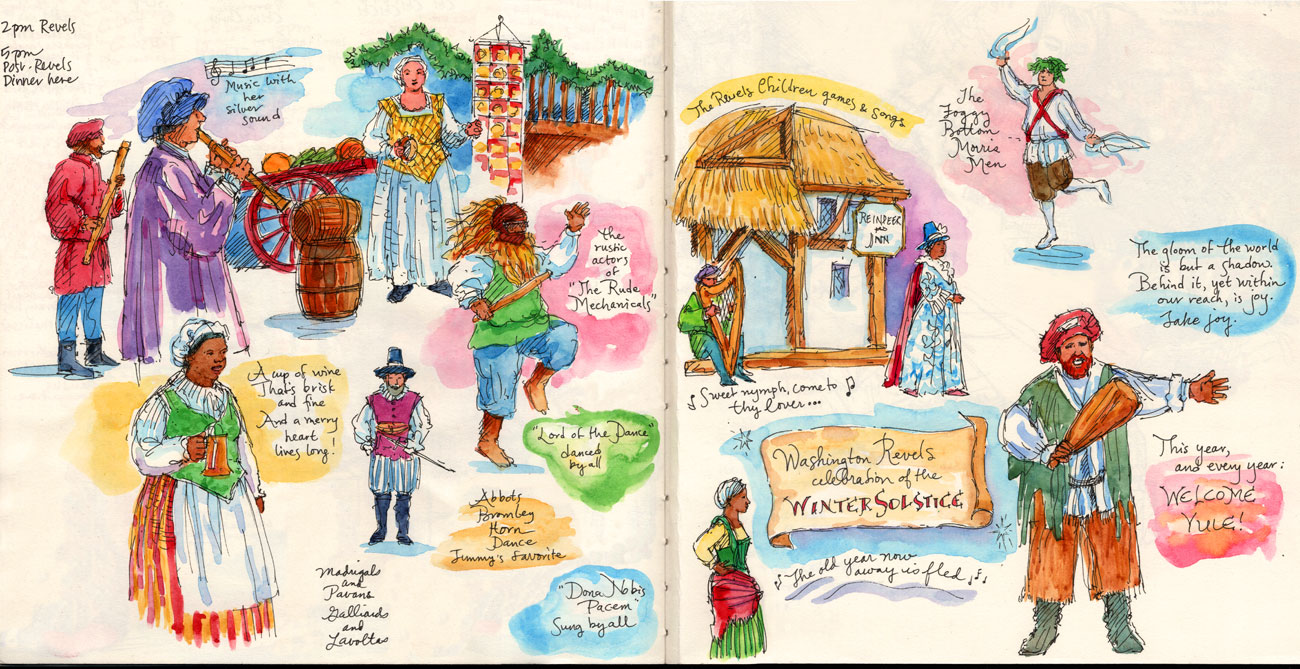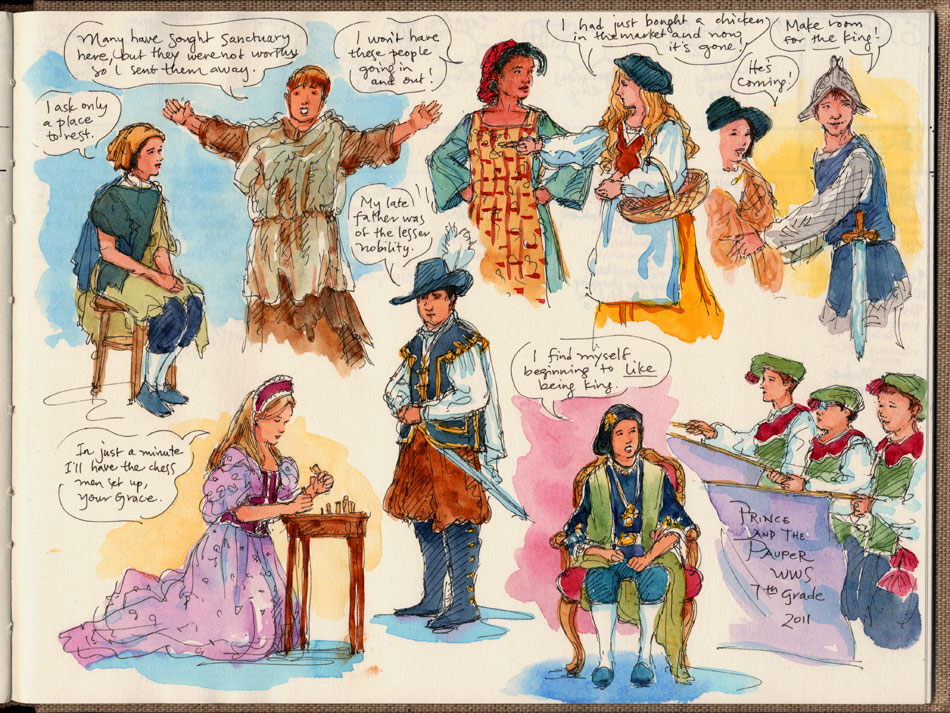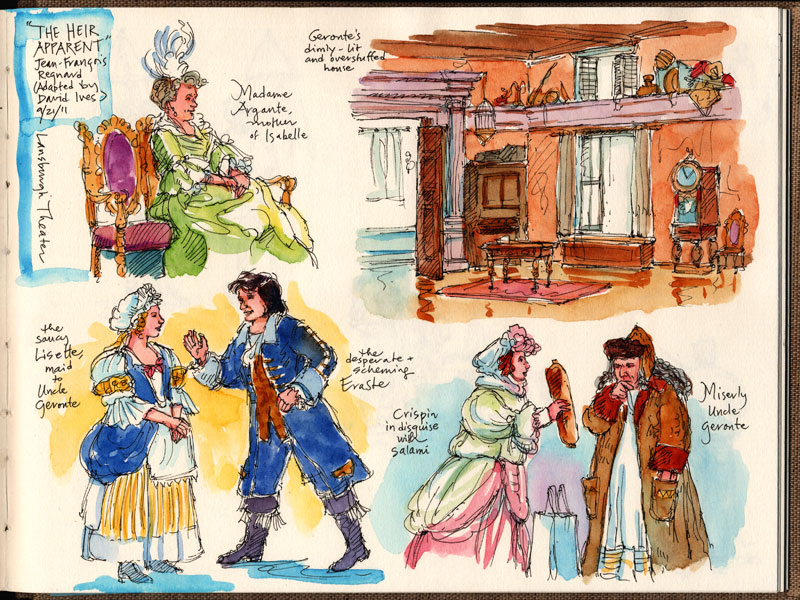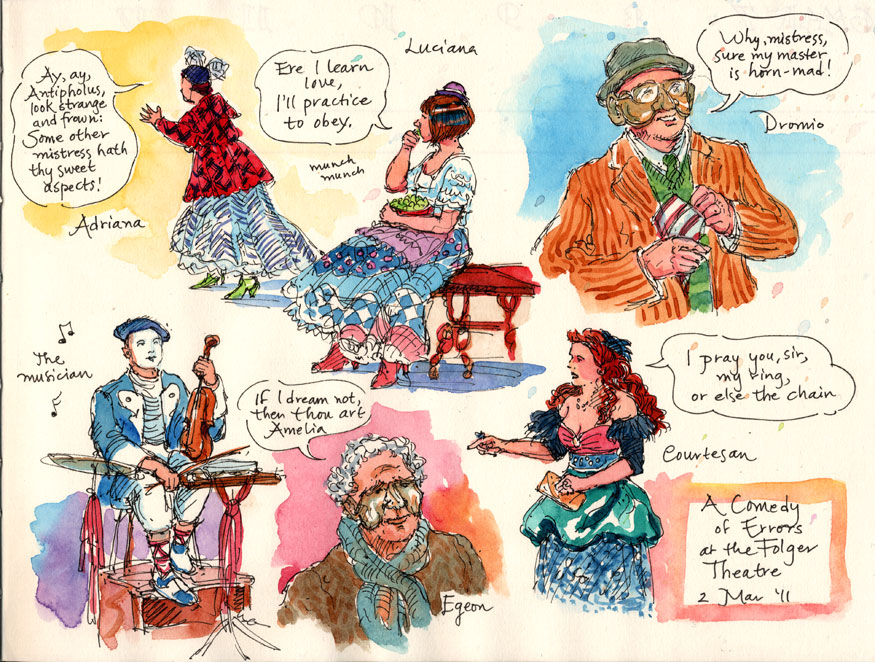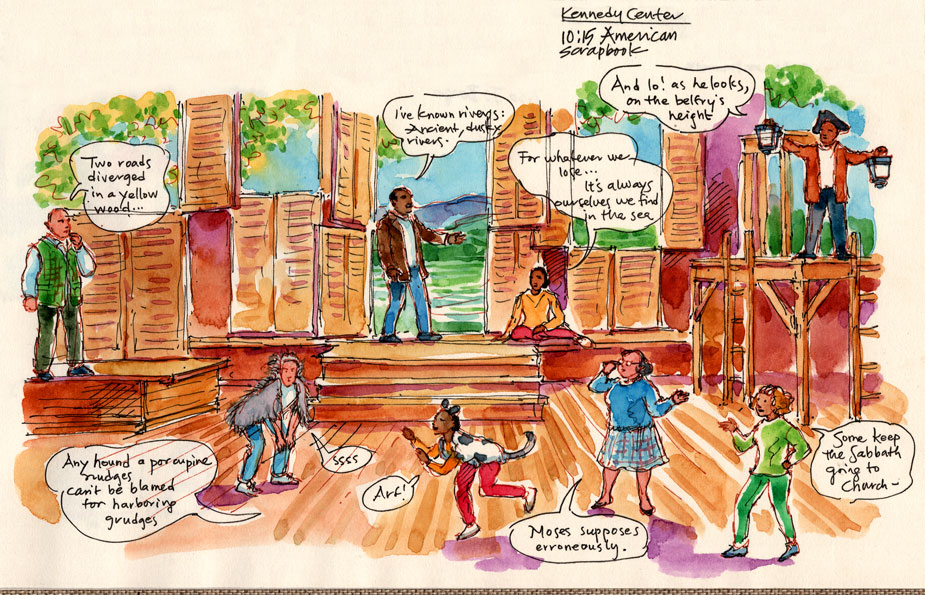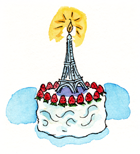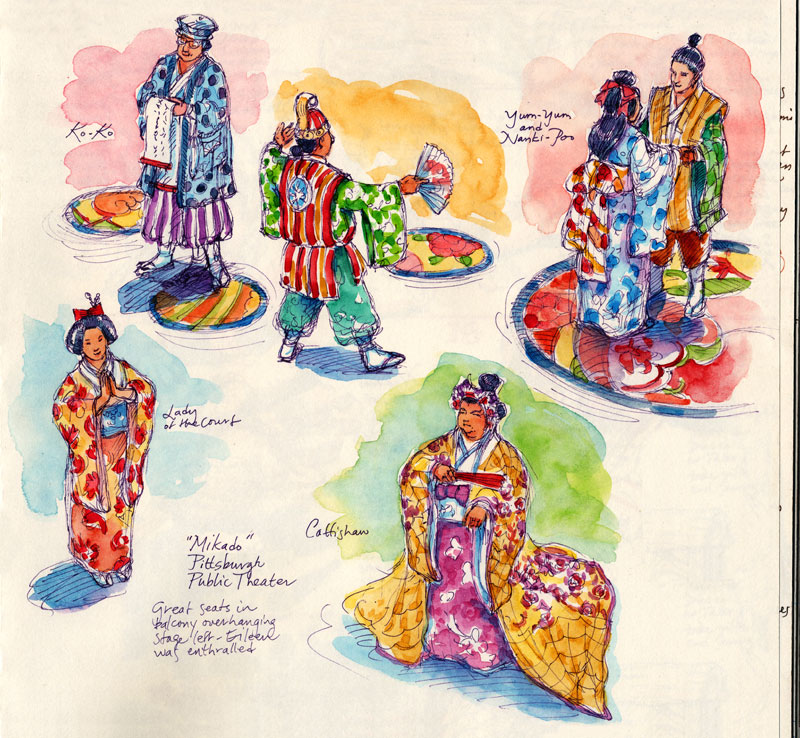
Tag: Theater
Staunton, Part 1: Shakespeare and Snowflakes
I’d heard for years about the town of Staunton, Virginia, and finally persuaded my reluctant husband to have a romantic getaway. Well, as romantic as it can be when you have the dog along. The focus of our visit was the American Shakespeare Center, at which we saw two plays, but the entire town is a jewel box of discoveries. Even more delightful, I’ll bet, on a fine spring day.
The Panties, the Partner, and the Profit
Sketches from a reading of David Ives’ play, The Panties, the Partner, and the Profit: Scenes from the Heroic Life of the Middle Class, at the Lansburgh. It’s another of Ives’ clever and amusing “translaptations,” and I look forward to seeing the full stage production during Michael Kahn’s last season.
Andalusian Treasures
At all the major festivals and turning points of the year, it’s a natural impulse to find commonalities within the celebration with the larger human community, past and present, and gain a sense of connection.
In this winter season, one especially delightful and moving experience of shared celebration is found in the music, dance, and storytelling of the Washington Revels, which each year changes its theme (always carefully researched and skillfully interpreted) but whose underlying message acknowledges and salutes the struggle to find beauty, joy, humor, peace, and love amid the darkness, uncertainty, and losses of our life journeys.
This year’s theme is Andalusian Treasures, and I quote:
Our 29th annual celebration of the winter solstice harkens back over 1,000 years to the confluence of Moorish, Sephardic and Iberian cultures in medieval Andalusia. Led by the antics of two fools, and joined by guest musicians, Trio Sefardi and Layali El Andalus (“Andalusian Nights” in Arabic), we celebrate the legacy of the extraordinary flowering of arts and culture that began there and extended to much of the world for centuries thereafter. Presenting the three cultures together on stage, we honor the symbol that Andalusia has become (however imperfect the reality) of the ideal of greater tolerance and acceptance among different cultures and religions.
Shows run December 3-4 & 9-11, matinees and evenings, at GW Lisner Auditorium in Washington, DC, and there are still tickets available through the Revels website. Believe me, once you have sung and danced for the solstice with a thousand gladsome companions, you will want to make it a family tradition.
The sketches above are from a 2007 Renaissance Revels. For more Revels sketches, and a mini-history, please see Revelry.
Prince and the Pauper
I sat in one day on a rehearsal of my daughter’s class play and surreptitiously made some sketches. Having seen a number of middle school plays over the years in which the objective seems to be to finish and get off stage as fast as possible, I was struck by the students’ expressiveness, pacing, and evident understanding of their roles.
The Heir Apparent
Where can you go in DC this month to see a cranky wildly bewigged miser erroneously thought to be a corpse, feisty amorous twenty-somethings cavorting in 17th-century costume, a fantastically attired and exceedingly speedy cross-dressing gentleman, and an adorable live piglet, involved in a ridiculous yet intricate story spoken entirely in clever and hilarious verse (well, except by the piglet) in which all will be satisfyingly resolved by the end?
As far as I know, only at the Lansburgh Theater, in the current production of The Heir Apparent, written by Jean-François Regnard in French but brilliantly adapted into English (with sneaky modern references) by David Ives. If you would like to spend an entire evening laughing, run run run to get a ticket.
(No photography is allowed, but they don’t say a thing about sketching. Which is a bit tricky in the dark.)
Today is also the anniversary of the emancipation of poet and colonial slave Phillis Wheatley (circa 1753-1784). For a painting, poem, and mini-bio, please see An Hymn to Phillis.
Scapino at Sidwell
From time to time we attend a play at my son’s old high school. Productions range from crowd-pleasing classics like Damn Yankees and Fiddler on the Roof to more recent and edgy works by the likes of Tom Stoppard and David Ives. All are beautifully produced and well-acted, and recognizing students in the cast makes it even more fun. This month they put up Scapino, adapted from Molière’s Les Fourberies de Scapin, a zany romp inspired by commedia dell’arte, featuring star-crossed lovers, humorous mix-ups, and the classic scheming yet lovable servant who brings everything to a satisfying happy ending. The gymnastics and athletic physical humor required for the roles made it an appropriate vehicle for energetic teens. Oof.
To Err is Divine
If you live in the Washington, DC area and you would like to spend two hours in culturally elevated laughter, run run run to the Folger Shakespeare Library and purchase a ticket to A Comedy of Errors.
You may already be acquainted with the plot—lost and separated twins, eccentric servants, misguided lovers, amusing mix-ups, and a happy ending all around (which familiar elements—except for the last—Shakespeare adopted from ancient Roman comedy). But it’s well worth another viewing in this current manifestation, framed somewhat unusually in a manner I will not divulge, and influenced by Italian Commedia dell’Arte with its masks, wild costumes, and physical gags, here not excessively annoying. The Folger Theatre itself is worth the visit, a warm, wood-paneled and intimate space that feels more residential than institutional.
My daughter and I saw a mid-week matinee for school groups, most of them high school students greatly appreciative of the bawdy jokes that went over the heads of our younger homeschoolers.
For another illustration in celebration of this day, please see Saved by the Bell.
American Scrapbook
Unbelievably, it has been FIFTY YEARS since the inauguration of John F. Kennedy, and in honor of this anniversary the Kennedy Center here in Washington, DC has created a blockbuster lineup of events. Both President and Jacqueline Kennedy were enthusiastic supporters of the arts, so the celebration includes a bounteous variety of musical, theatrical, and dance performances, some ticketed and some free of charge. It is, after all, the Kennedys who helped bring to fruition a long-languishing plan for a National Cultural Center, which was renamed the Kennedy Center after Kennedy’s assassination in 1963.
Whatever you may think of its architectual style, you must acknowledge that it’s been a fantastic addition to the Washington cultural scene all these years, providing a setting for a huge range of artistic performances (including Millennium Stage, with 365 free performances a year!) and inspiring the launch of many additional venues. And it has a lovely view from the terrace. Anyway, we’re all used to it now, as a familiar icon for which we feel affection, like some eccentric great-aunt who is known for her peculiar hats.
As part of a homeschoolers’ outing, my daughter and I attended American Scrapbook, A Celebration of Verse, a theatrical interpretation of some of the Kennedys’ favorite poetry. The family had a lovely tradition which (WARNING) will assuredly make you long to go back and raise your semi-literate, poetry-impaired children all over again: for the parents’ birthdays, the children Caroline and John Jr. each chose poems and then created drawings to accompany them, which were then pasted into a scrapbook.
This scrapbook collection inspired the play, which was essentially a seamlessly interwoven, thematically arranged series of “recitations”—although I hesitate to use that dry schoolhouse term, because the interpretations were so engaging and heartfelt. (I tried to sketch, but it was pretty dark and the actors were awfully “active,” thus the rough, scribbled result.)
The set was simple, modest, effective: tall wooden shutters that opened and closed in a variety of configurations to reveal changing images that supported, rather than distracted from, the spoken word.
Lively, imaginative, yet true to the spirit of the poems, the program transfixed the audience of elementary and middle-school children for an hour, which, when you’re talking about poetry, is truly a laudable achievement.
For He Is An Englishman
Today is the birthday of humorous librettist, dramatist, and director W.S. (William Schwenck) Gilbert (1836-1911), a man who knew how to make a line scan perfectly. It makes singing his verses so very satisfying.
In his honor, I post these sketches from a fabulous performance of The Mikado, probably Gilbert and Sullivan’s best-known and most often performed comic opera. This one took place at the Pittsburgh Public Theater a few seasons back.
The “Japanese” names, like the nonsensical G&S plots and their occasionally offensive point of view, must be taken, like most forms of entertainment, in historical context—this one, that of a supremely confident 19th-century colonial power. It’s still fun.

